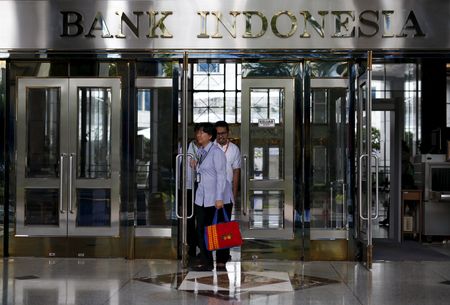By Gayatri Suroyo and Stefanno Sulaiman
JAKARTA (Reuters) -Indonesia’s central bank raised its key interest rate by 50 basis points for a third consecutive month on Thursday, saying it will strengthen its response to “high” inflation expectations amid a strong economic backdrop.
Bank Indonesia (BI) raised the 7-day reverse repo rate to 5.25%, as expected by the majority of economists polled by Reuters. It also raised its other policy rates by the same amount.
Governor Perry Warjiyo told an online news conference that the “front-loaded” and “pre-emptive” move was aimed at anchoring inflation expectations and stepping up support for the rupiah.
While the global economy was slowing and some countries were facing recession risks, he said activity in Southeast Asia’s largest economy was improving. The central bank stuck to its forecast that growth will be at the upper end of its 4.5%-5.3% forecast range in 2022, adding GDP will be “high” next year.
“Bank Indonesia will strengthen monetary policy response to lower inflation expectations that are currently too high,” Warjiyo said, adding BI’s rate hikes were more “measured” and not as “aggressive” as those being delivered in some other countries.
At a conference call with investors later on Thursday, Warjiyo described BI’s rate policy as “hawkish”, while vowing to continue intervening in the foreign exchange market to stabilise the rupiah’s exchange rate.
With Thursday’s move, BI has increased interest rates by a total of 175 bps since August, matching the scale of its last tightening cycle in 2018.
The rupiah was largely unchanged after the decision. It has fallen around 9% against the dollar so far this year as the greenback has been buoyed by the Federal Reserve’s aggressive monetary tightening.
MORE RATE HIKES SEEN
While Indonesia’s inflation rate eased to 5.71% in October, it remained above BI’s 2-4% target range for the fifth straight month and near a seven-year high of 5.95% in September.
Warjiyo said the market’s current consensus forecast for end-2022 inflation of 5.9% was “too high” compared with BI’s revised expectation of 5.6%. Core inflation was expected to peak at 3.7% in the first quarter of 2023, he said.
Indonesia’s inflation, already under pressure due to high global food prices, has accelerated after the government raised subsidised fuel prices by about 30% in September.
Gareth Leather, senior economist at Capital Economics, said with economic growth holding up well, he expected BI to press ahead with more hikes in the near term.
“We expect a further 75bps of hikes over the coming months before the central bank brings its tightening cycle to a close in early 2023,” he said.
Bank Mandiri economist Faisal Rachman predicts two more 25-bp hikes by the first half of next year, expecting inflation staying around 5-6% at least until June 2023.
The central bank’s decision came after data showed Indonesia’s economy expanded 5.72% from a year earlier in the third quarter, the fastest pace in over a year.
Warjiyo said Indonesia’s economic fundamentals were sound, pointing to robust growth, booming exports and an expected current account surplus for 2022.
Predicting the Fed to end its tightening cycle in the first quarter of 2023, Warjiyo said that would mark a “turning point” for the rupiah and the currency should strengthen.
BI would soon offer a financial instrument with advantageous interest rates aimed at making it more attractive for banks’ depositors to keep their foreign exchange in the country, deputy governor Destry Damayanti said.
(Reporting by Gayatri Suroyo, Stefanno Sulaiman, Bernadette Christina Munthe; Editing by Kanupriya Kapoor, Ana Nicolaci da Costa and Simon Cameron-Moore)

